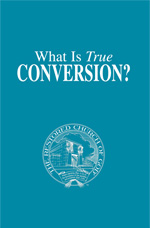 BERND WUSTNECK/PICTURE ALLIANCE VIA GETTY IMAGES
BERND WUSTNECK/PICTURE ALLIANCE VIA GETTY IMAGES
Personals from the Editor
Learn the why behind the headlines.
Subscribe to the Real Truth for FREE news and analysis.
Subscribe NowSoon after delivering Israel from Egypt in a mighty display of power, God gave mankind the Ten Commandments at Mount Sinai. The first two are: (1) “You shall have no other gods before Me” and (2) “You shall not make unto you any graven image, or any likeness of any thing that is in heaven above, or that is in the earth beneath, or that is in the water under the earth. You shall not bow down yourself to them, nor serve them” (Ex. 20:3-5).
The tenth commandment—“You shall not covet your neighbor’s house, you shall not covet your neighbor’s wife, nor his manservant, nor his maidservant, nor his ox, nor his ass, nor any thing that is your neighbor’s” (vs. 17)—is directly related. The apostle Paul warned in Colossians 3:5, “Mortify therefore your members which are upon the earth; fornication, uncleanness, inordinate affection, evil concupiscence, and covetousness, which is idolatry.”
These three commands forbidding other gods, idolatry and covetousness are intricately connected. They are also at the core of a spiritual crisis plaguing mankind, but understood by few!
While some Christians understand idols of any kind—including crosses, statues and pictures supposedly depicting God—violate the plain words of Exodus, a more subtle and perhaps even deadlier violation of these commandments pervades the Western world.
God explained to the prophet Ezekiel that there are those who “set up their idols in their heart” (Ezek. 14:3). Proverbs shows that as a man “thinks in his heart, so is he” (23:7). Examining mindsets, attitudes and thoughts—what is in one’s heart—is key to discerning this most pervasive form of idolatry.
My book America and Britain in Prophecy explains the Bible’s clear identification of modern Israel—primarily Western, English-speaking nations. (Jews form only one of the 12 tribes that sprang from the patriarch Israel, that of Judah.) God warns Israel, “Therefore speak unto them, and say unto them, Thus says the Lord God; Every man of the house of Israel that sets up his idols in his heart, and puts the stumblingblock of his iniquity before his face, and comes to the prophet; I the Lord will answer him that comes according to the multitude of his idols” (Ezek. 14:4).
The grave consequences of this are next laid out: “That I may take the house of Israel in their own heart, because they are all estranged from Me through their idols” (vs. 5). Nothing could be more serious! These idols separate humanity from their Creator.
God then gives the solution: “Therefore say unto the house of Israel, Thus says the Lord God; Repent, and turn yourselves from your idols; and turn away your faces from all your abominations” (vs. 6).
Repent means change!
But what are these idols of the heart? Recall Paul connected idolatry to covetousness. The Greek word for “covetousness” here means avarice—great greed. In a society built on materialism and a focus on the physical rather than the spiritual, this sin is everywhere.
The “god” of materialism is worshiped more than the true God. It is “served” above all else. The desire for more things and pleasure is the primary driver of society. While God is the giver of every good and perfect gift, which certainly includes many wonderful physical things this life has to offer, our focus on the physical should never outweigh our focus on God and His way of life.
Christ did not dismiss physical needs—but He placed far greater weight on the spiritual when telling Satan the devil: “Man shall not live by bread alone, but by every word that proceeds out of the mouth of God” (Matt. 4:4).
Later in Matthew, He was asked, “Master, which is the great commandment in the law?” (22:36).
His answer greatly amplified the commandments given at Mount Sinai: “Jesus said unto him, You shall love the Lord your God with all your heart, and with all your soul, and with all your mind. This is the first and great commandment” (vs. 37-38).
Ask: What do I value more than God? What do I put before God? What idols—visible or “in the heart”—can I identify?
Learning how to truly change and develop a spiritual mindset is at the core of what it means to be a Christian. It is not easy, but there is a very achievable path laid out by the God “who will have all men to be saved, and to come unto the knowledge of the truth” (I Tim. 2:4).
My booklet What Is True Conversion? and “True Conversion—Explained!” World to Come video series explain from the scriptures how to escape these hidden sins of the heart and how to instead pursue eternal life!
Review them now to learn what the entire world will learn in the soon-coming Kingdom of God.



